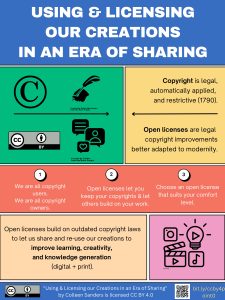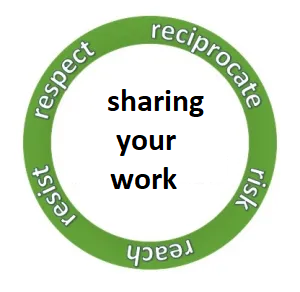3 Student Project Open Licensing Guide
Student Project Open Licensing Guide

View a higher-resolution version of the poster above.
Sharing Your Work
Faculty invite students into a different relationship with knowledge when they create assignments that can be openly licensed. Rather than completing an assignment that you will never look at again, you can create a project that helps future students and communities to learn, grow, and change. You will share your work with a specific audience.
When you create an openly licensed project, you become a collaborator and creator. You are creating something that will be used in future classes, by students, faculty or both. Many students find this new approach to learning exciting and rewarding.
To learn more about open educational resources (OER), consult this short guide.
Planning your Project
Think about how you will begin an openly licensed project, considering the following questions:
- What could the project include? What do you want future students or faculty to be able to do after engaging with your project?
- What content do you want/need to cover?
- It can be helpful to map your content to ensure that nothing gets lost.
- What is the process for this work going to look like?
- Think about what the final format of this project might be and work backward in order to determine what is necessary to create it. For example, if you want to produce a video to go with an OER textbook, you may need to talk with your instructor about video accessing software.
Student consent
Once your project is finished, it’s time to license your work.
- You may have a variety of legitimate reasons for not wanting to share your work openly. You have choices about how you wish to share your project. You may wish to share your work under a pseudonym. You may also decide not to openly license your project.
- Please choose a creative commons license for your work that best suits your goals for future use. Please refer to Open Educational Resources and Accessibility Guide for help in choosing your license.
- Use this tool to attach the license to your work. We recommend this license: CC BY 4.0.
- Please note: if you choose to opt out, it will not impact your grade for this course.
Attributions
This work is adapted from “Quick Guide to Open Pedagogy for Students” by Veronica Vold for Open Oregon Educational Resources, which is remixed from:
- “Designing a Renewable Assignment Worksheet” by Stacy Katz and Abbey Elder, which is licensed under CC BY 4.0,
- “The Open Pedagogy Project Roadmap” by Christina Riehman-Murphy and Bryan McGeary, licensed CC BY-NC 4.0,
- “Open Pedagogy” by the Rebus Community, A Guide to Making Open Textbooks with Students, licensed under CC BY 4.0.License..
Adaptations by Elizabeth Pearce and Deron Carter include focus on student agency and user-friendly language.
Image source: “5Rs of student sharing” by Colleen Sanders is adapted from “5 Rs of open pedagogy” by Rajiv Jhangiani, CC BY SA 4.0. Adaptation includes substituting user-friendly language.
![]() “Student Project Licensing Guide” by Elizabeth Pearce and Deron Carter is licensed under CC BY-NC 4.0.
“Student Project Licensing Guide” by Elizabeth Pearce and Deron Carter is licensed under CC BY-NC 4.0.

